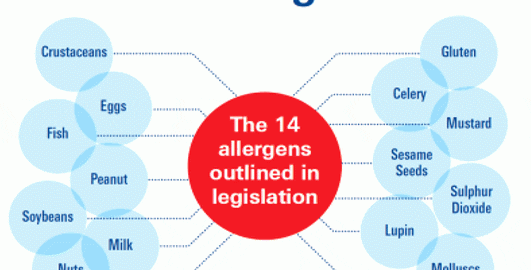The importance of allergen awareness
A food allergy is an abnormal reaction of a person’s immune system to certain proteins in food. These proteins are known as “allergens” and these reactions at times can be fatal. Incidences with allergens in developed countries has shown a steady rise since the 1950’s. In Ireland it is estimated that 3% of the population has a food allergy.
There are 14 major allergens that you must declare by law:
- Cereals containing gluten – The cereal name e.g ‘wheat’, must be declared and highlighted, not ‘gluten’
- Crustaceans
- Eggs
- Fish
- Peanuts
- Soybeans
- Milk
- Nuts The name of the nut, e.g. ‘almond’, must be declared and highlighted, not ‘nuts’
- Celery
- Mustard
- Sesame Seeds
- Sulphur Dioxide and sulphites (at concentrations of more than 10mg/kg or 10mg/L in terms of total sulphur dioxide)
- Lupin
- Molluscs
It is important as a food business operator to be aware of all relevant legislation related to allergens the following legislation has relevant information related to Allergens in a food business:
- REGULATION (EU) No 1169/2011 on the provision of food information to consumers
- REGULATION (EC) No 178/2002 laying down the general principles and requirements of food law, establishing the European Food Safety Authority and laying down procedures in matters of food safety
- REGULATION (EU) No 852/2004 on the hygiene of foodstuffs
All food businesses have a legal responsibility to prepare and sell safe food. Having the correct policies and procedures in place will help ensure this is done. All staff members should be competent in taking orders for customers with allergies and should be able to provide any relevant information to the customer.
You should designate separate equipment and utensils for preparing allergen free food items and if possible, a separate area for preparation. In some circumstances due to space this may not be possible. In this instance strict cleaning procedures should be in place to prevent any cross contamination of allergen containing and non-allergen containing ingredients. You should also consider storage of ingredients. Store allergen containing ingredients separate to non-allergen containing ingredients. Having the correct procedures in place along with allergen awareness training will ensure no cross contamination should take place from the delivery of the ingredients all the way through serving the food to the customer.
All employees should be allergen aware and receive the correct training in relation to handling allergens from taking a customers order to preparing the food. The Food Safety Company offers a range of courses that give comprehensive allergen training. To view our training courses click here.
Communication with your customers is key, this shows the customer you are aware of food allergies, are an allergen aware business and encourages them to ask questions about the foods you prepare or sell.
You must declare allergens, and you should have an allergen menu readily available for customers to consult if required. This can be done via the menu or by using a separate allergen matrix (click here for a sample allergen menu).
If a customer has an allergic reaction, it is important to act quickly. The symptoms you should look out for include but are not limited to itchiness, swelling of the tongue, rash, eczema, vomiting, fainting and anaphylaxis.
If you do not adhere to correct procedures you may be endangering the life of your customers. Our consultants can help you ensure you are compliant with allergen legislation. Click here to learn more about our consultancy services.
Tags: Allergens, allergen training


